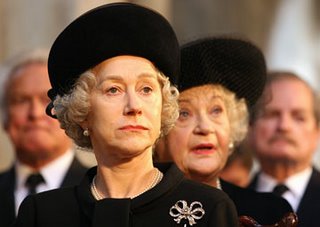The Queen

“Two households, both alike in dignity…” – Shakespeare’s Romeo and Juliet
I’ve never much liked British Prime Minster Tony Blair’s “New Britannia” and his push to minimize the monarchy and anything that smacks of outdated vestiges of England’s past. To this Anglophile, it always seemed that the very traditions he wanted to abolish were the very things I adored from afar. While I understood and sympathized with his perceived need to drag the United Kingdom into a brave, new world, I always wished I wasn’t around to see it happen.
The Queen is, subconsciously, that drama played out across a single, staggering incident in England’s recent history.
During the summer of 1997, Tony Blair and his Labor Party swept into office in a landslide, flush with a mandate from the people to clean house from the previous, conservative, Thatcher government. By no means a Royalist, Blair and his middle-class ideals posed a thorny if symbolic threat to the monarchy, presided over by Queen Elizabeth. Little did Buckingham Palace know that Blair’s ascension was to be a quickly forgotten historical footnote compared to what was to come next. The monarchy and the Prime Minster’s office would clash late that summer not over politics, but over a completely unforeseen personal tragedy—the death of Princess Diana of Wales in a car crash in Paris.
Following the death, Elizabeth (played with Oscar-gravitas by the great Helen Mirren), a very private woman in a very public role, makes the only proper decision a woman in her place could make. As the divorced Diana was, by her own choice, no longer a member of the royal family, there will be no formal recognition of the incident from the royal family. Protocol demands nothing less than the fulfillment of the letter of the law.
Newly minted Blair (Michael Sheen), flushed with the arrogance that comes with youth and success, is not so sure. While the royal family remains holed up at their Scottish estate far from London, Blair takes the temperature of the British people and realizes that the Queen’s icy aloofness and resolve could devastate the monarchy. He may disagree with their relevance, but a toppling like this is too much even for him. Everyday the monarchy remains silent, the national mood sours against them. His television set awash with a sea of flowers and mourners, Blair begs Elizabeth repeatedly to reconsider her position and give into some sort of public expression of sympathy for “The People’s Princess.” That the film does not manufacture false and cloying sentimentality about Diana’s death is exactly right—this movie is not about the loss of Diana (seen repeatedly in rare stock footage), but what comes after.
The Queen is a hybrid picture, a microscopic examination of two houses to which we have exclusive, “backstage” passes. While the camera lingers with the royal family, the mood is austere, formal and sterile, cocooned against discomfort or ugliness. Words are spoken properly and guardedly. Emotions are subdued. The cinematography is lush and warm; soft light spills from one character to the next. When the camera enters Blair’s world, however, it is an existence of cluttered and messy domesticity. First names are informally bantered about. At #10 Downing Street, toys are scattered about the floor, Crayola drawings are taped to the walls and dishes desperately need washing.
If, in the beginning, the royals appear callous and heartless, Blair and his cronies appear as petty and petulant children. One of The Queen’s staggering strengths is that it is capable of showing two equally correct sides of the same coin and leave you feeling as if both were equally right, and both equally wrong. This film should be required viewing for all public relations majors.
Blair is a man of a new millennium, just the sort of man to lead his antiquated kingdom into a new age. And Elizabeth is a woman rooted and framed in an ancient and exquisitely beautiful tradition. Her life and activities steeped in antiquity, it is, nonetheless, a life left behind by her people. The world, for now, is not done with either of them yet. As Elizabeth struggles to maintain her personal dignity in the face of immense and anguished public scrutiny, so too must Blair recognize the titanic structures of time-honored belief upon which he stands. The Queen refuses to demonize either side—it is a testament to the film that when the credits role, you find yourself left with a great affection and empathy for both sides.
The Queen is an unqualified triumph that works on all levels. Director Stephen Frears has made a gem of a film.
Peter Morgan’s screenplay is focused, literate, and perceptive, if given a bit too often to patches of unnecessary exposition. A paralleling story about a stag hunt provides for a beautiful metaphor of the monarch’s life (as well as one of the most soaring shots in any film this year).
The acting is superb. While Sheen is indeed fantastic (as are many of the smaller roles, particularly Alex Jenning’s Prince Charles), it is Mirren who possesses the power to take the audience’s collective breath away. Not since Ben Kingsley in Gandhi has an actor so inhabited or so channeled a historical figure. Mirren’s acting was invisible.
In the end, the grieving public is appeased, Elizabeth gives in, and Blair’s popularity is stratospheric. In a scene reminiscent of their first meeting after his installation, Blair and Queen Elizabeth sit in Buckingham, discussing both the past and the future. Without any sense of malice or spite, Elizabeth looks Blair in the eye and utters a warming. Though his popularity may be limitless now, there will come a time when it will suddenly face dire and unanticipated circumstances. The moment gave me shivers as I thought of the colossal unpopularity of the war in Iraq and the bare, wispy shell of a politician that even now, is shrinking, humbled, out of office at #10.


0 Comments:
Post a Comment
<< Home